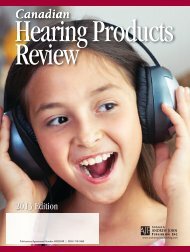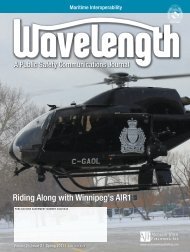Volume 8 Issue 1 (pdf) - Andrew John Publishing Inc
Volume 8 Issue 1 (pdf) - Andrew John Publishing Inc
Volume 8 Issue 1 (pdf) - Andrew John Publishing Inc
Create successful ePaper yourself
Turn your PDF publications into a flip-book with our unique Google optimized e-Paper software.
|<br />
provides us with an amazing insight into<br />
the issues and audiological hurdles of the<br />
early 1980s.<br />
Section III deals with “Engineering<br />
Applications – Special Problems.” Topics<br />
include acoustic feedback control,<br />
telephone coupling, transducer and<br />
earmold effects, signal and speech<br />
processing, the evaluation of compression<br />
processing, and a new topic- recent<br />
research on multi-band compression.<br />
Again, the author list is impressive – S.<br />
Lybarger, D. Egolf, M. Killion, E. Libby,<br />
J. Lim, R. Schafer, L. Braida, N. Durlach,<br />
and E. Villchur. Some of the material in<br />
this section is dated but it’s nice to see the<br />
original thoughts of some of the founders<br />
and early thinkers of this field. Acoustic<br />
feedback control was limited to simple<br />
phase shifting by an all pass filter that<br />
was non-linear with respect to phase- a<br />
far cry from today’s use of phase control,<br />
notching filtering, and gain reduction,<br />
sometimes all available in one hearing aid<br />
product. E. Villchur is known as the<br />
father of modern day compression, and<br />
although his article is from 1981, it’s well<br />
worth re-reading even today. (See also<br />
Founders of our Profession interview<br />
with Eddie Villchur in the Canadian<br />
Hearing Report 2008:3[1]:19–20.)<br />
The final section (IV) is about the<br />
Delivery of Services and this discussion<br />
is as valid today as it was 30 years ago.<br />
<strong>Issue</strong>s discussed were about hearing aid<br />
selection, a basis for selection<br />
amplification characteristics, validation<br />
of the selection measures and measures<br />
of hearing aid fitting success, factors<br />
affecting hearing aid use, and my<br />
personal favourite, a chapter by Mark<br />
Ross on Communication Access.<br />
Although Dr. Ross’s article was written<br />
more than 30 years ago, it is still apropos<br />
to today’s time. (See also Founders of our<br />
Profession interview with Mark Ross in<br />
the Canadian Hearing Report<br />
2009;4(1):28–30.) Other authors read<br />
like the list of rock stars that they were-<br />
G. Studebaker, L. Beck, M. Skinner, D.<br />
Pasco, J. Miller, G. Popelka, G.<br />
McCandless, D. Byrne, B. Walden, E.<br />
Owens, M. Osberger, M. Collins, M.<br />
Ross, and D. Konkle.<br />
Finally Fred Bess and Wayne Olsen<br />
wrapped it up in the final section V<br />
“Research Needs.” Many of these issues<br />
and topics have still not been resolved<br />
today, but we are on our way.<br />
The Vanderbilt Report is a conglomeration<br />
of the state of the art 30 years<br />
ago. Reading through the yellowed<br />
pages will provide the reader with insight<br />
of where we have been, and even more<br />
importantly, where we are going.<br />
Canadian Hearing Report 2013;8(1):19-20.<br />
The Moneca Price Humanitarian<br />
award is presented to an audiologist<br />
in recognition of extraordinary<br />
humanitarian and community service,<br />
above and beyond the requirements of<br />
employment. The award is to honour<br />
the late Moneca Price, who took on<br />
significant leadership roles in both the<br />
Canadian Academy of Audiology (CAA)<br />
and the College of Audiologists and<br />
Congratulations to Gilbert Li,<br />
Winner of the 2012 CAA Moneca Price<br />
Humanitarian Award<br />
Speech Language Pathologists of Ontario<br />
(CASLPO).<br />
This year’s winner, Gilbert Li, provides<br />
free audiology services in underprivileged<br />
regions in the Yunnan<br />
Province of China. Prior to each visit,<br />
Gilbert invests substantial personal time<br />
in soliciting donated or refurbished<br />
hearing aids and equipment in<br />
preparation for his humanitarian work.<br />
The organization he volunteers with is<br />
called EMAS (Education, Medical Aid<br />
and Service). His team has seen over 300<br />
people and dispensed 207 hearing aids<br />
– free of charge. The $500 award he<br />
received at the 2012 CAA conference in<br />
Ottawa was put towards furthering his<br />
work on another trip to China in<br />
November.<br />
20 CANADIAN HEARING REPORT | REVUE CANADIENNE D’AUDITION






